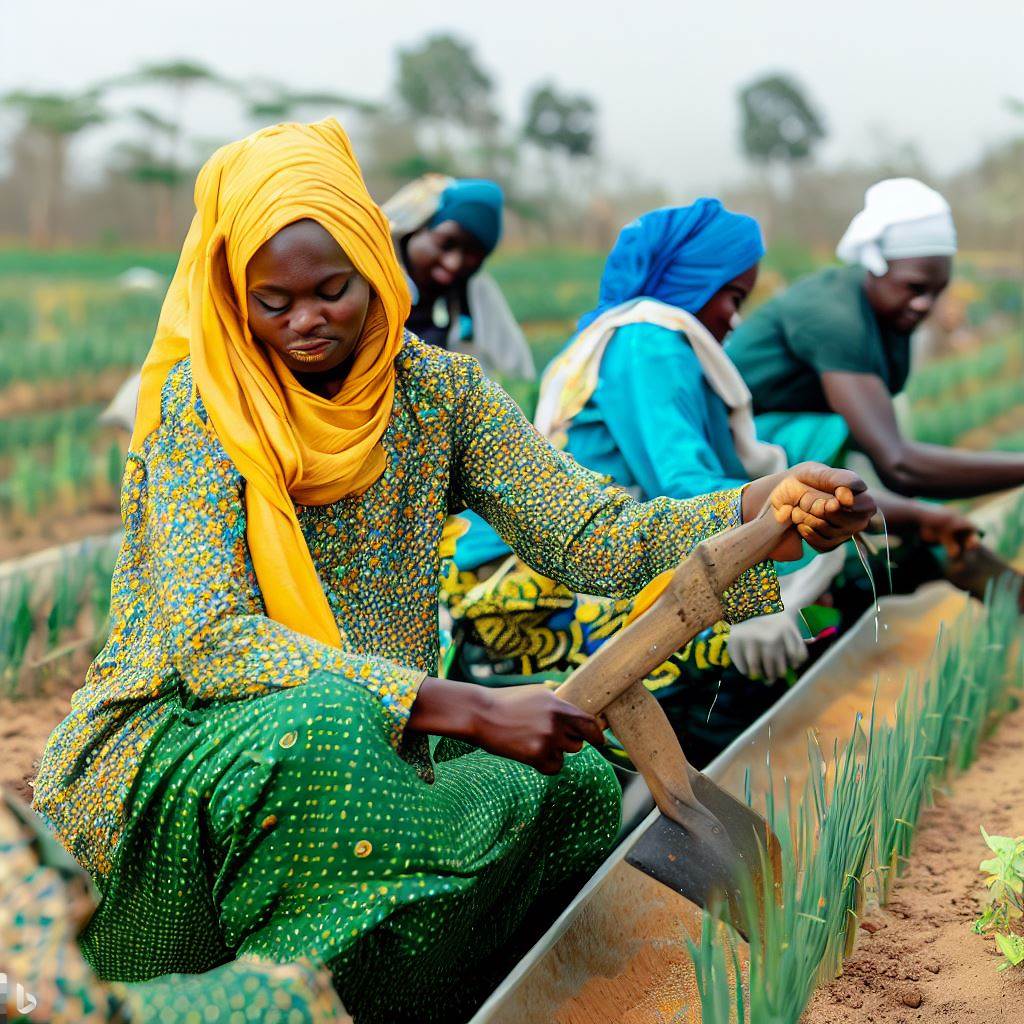Introduction
In this blog post, we will explore the topic of gender diversity in Nigeria’s agricultural operations management.
But before delving into the specifics of Nigeria, let’s first understand the broader context of gender diversity in agriculture globally.
Globally, gender diversity in agriculture is a pressing issue that affects the sustainable development of the sector.
Women play a significant role in agricultural production but often face gender-based constraints, such as limited access to resources, education, and decision-making power.
Now turning our focus to Nigeria’s agricultural sector, it is important to note that agriculture is a crucial pillar of the country’s economy.
The sector employs a significant portion of the population and contributes to food security and economic growth.
Studying gender diversity in agricultural operations management in Nigeria is of great importance for several reasons.
Firstly, it enables a better understanding of the specific challenges women face in the sector, such as limited access to credit, land, and modern farming techniques.
Secondly, addressing gender diversity issues in agricultural operations management can lead to more inclusive and sustainable agricultural practices, ultimately benefiting farmers, rural communities, and the overall economy.
In general, this blog post aims to shed light on gender diversity in Nigeria’s agricultural operations management.
By understanding the global context, the unique characteristics of Nigeria’s agricultural sector, and the importance of studying gender diversity, we can pave the way for more inclusive and sustainable agricultural practices in the country.
Gender Roles in Nigerian Agriculture
Overview of traditional gender roles in Nigerian society
Traditional gender roles in Nigeria assign men as primary agricultural providers and decision-makers.
Women are often limited to subsidiary roles in agriculture, such as food processing or marketing.
These roles are deeply rooted in cultural and societal norms that have been passed down through generations.
Men are expected to be the breadwinners while women are expected to focus on household chores and child-rearing.
Historical perspective on women’s involvement in agriculture
Historically, women have always played a significant role in Nigerian agriculture.
They contribute to farming activities such as planting, weeding, harvesting, and livestock care.
However, their contributions are often overlooked or undervalued due to patriarchal societal structures.
Women’s involvement in agriculture has been primarily driven by necessity and not by recognition or empowerment.
Challenges faced by women in the sector
Women in Nigerian agriculture face numerous challenges that limit their participation and productivity.
Lack of access to land, credit, and modern farming technologies hinders women’s agricultural activities.
Gender-based discrimination and cultural biases perpetuate inequalities in resource allocation and decision-making.
Limited education and training opportunities further restrict women’s ability to adopt new agricultural practices.
Role of men in agricultural operations management
Men hold dominant positions in agricultural operations management in Nigeria.
They often control resources, make crucial decisions, and have greater access to markets and networks.
However, there is a growing recognition of the need for gender equality and women’s empowerment in agriculture.
Efforts are being made to involve men as allies in promoting women’s leadership and equal participation in the sector.
To sum it up, gender roles in Nigerian agriculture have been deeply rooted in traditional norms and cultural expectations.
Women have historically played significant but undervalued roles in farming activities. However, they face numerous challenges in accessing resources and opportunities in the sector.
Men hold dominant positions in agricultural operations management, but efforts are being made to promote gender equality and women’s empowerment.
Achieving gender diversity in Nigeria’s agricultural operations management is crucial for sustainable development and economic growth in the country.
Read: Interview Tips for Agronomy Sales Manager Roles
The Impact of Gender Diversity on Agricultural Operations
A. Economic benefits of promoting gender diversity
- Increased competitiveness and profitability
- Access to new markets and customers
- Expanding talent pool and attracting top talent
- Reduced turnover and retention costs
- Enhanced reputation and brand image
B. Enhanced productivity and efficiency through diverse teams
- Combining different perspectives, skills, and experiences for better problem-solving
- Creativity and innovation thrive in diverse work environments
- Higher employee motivation, engagement, and job satisfaction
- Improved communication and collaboration
- Efficient use of resources and increased operational effectiveness
C. Improved decision-making and problem-solving capabilities
- More balanced and well-informed decisions
- Reduced groupthink and bias
- Consideration of diverse viewpoints leads to more robust solutions
- Effective risk management through wider range of perspectives
- Enhanced ability to anticipate and adapt to changing market conditions
D. Importance of involving women in decision-making processes
- Representation and inclusion of women in leadership positions
- Addressing gender-specific needs and priorities in agricultural operations
- Fostering gender-responsive policies and initiatives
- Ensuring a more equitable distribution of resources and benefits
- Promoting social justice and empowering women in the agricultural sector
Read: Case Study: Successful Agronomy Sales Managers

Initiatives Promoting Gender Diversity in Nigeria’s Agricultural Operations Management
In Nigeria, there are various initiatives aimed at promoting gender diversity in agricultural operations management.
These initiatives are driven by both government policies and programs, as well as the efforts of non-governmental organizations and the private sector.
Through these initiatives, positive outcomes and success stories have been observed, showcasing the benefits of gender inclusion in this sector.
A. Government Policies and Programs Supporting Gender Inclusion
The Nigerian government has recognized the importance of gender diversity in agricultural operations management and has implemented policies and programs to support it.
These initiatives focus on providing equal opportunities and resources to both men and women in the sector.
- The National Gender Policy in Agriculture promotes equal access to land, credit, and other resources for both male and female farmers.
- The Women in Agriculture Program provides training, financial support, and mentorship opportunities specifically targeting women in the agricultural sector.
- The Agricultural Transformation Agenda includes a gender action plan that aims to address gender disparities and empower women in the sector.
B. Non-Governmental Organizations Working towards Gender Equality
In addition to government initiatives, several non-governmental organizations (NGOs) in Nigeria are actively working towards gender equality in agricultural operations management.
These organizations play a crucial role in advocating for women’s rights and providing support to women in the sector.
- The Women Farmers Advancement Network (WOFAN) empowers women farmers through training, capacity building, and access to finance and markets.
- The Self-Reliance Economic Advancement Program (SEAP) focuses on building the entrepreneurial skills of women in agriculture to enhance their economic independence.
- The International Federation of Women Lawyers (FIDA) provides legal aid and support to female farmers, advocating for their rights and protecting them against gender-based discrimination.
C. Private Sector Initiatives Championing Gender Diversity
Private sector companies in Nigeria have also recognized the importance of gender diversity and have initiated programs to promote it within their operations.
These initiatives not only strive for gender equality but also aim to improve overall productivity and innovation in the agricultural sector.
- Dangote Group, one of Nigeria’s largest conglomerates, has implemented initiatives to encourage women’s participation in agricultural value chains, including training and access to inputs and markets.
- Olam Nigeria, a leading agricultural commodity company, focuses on empowering women through their Olam Livelihood Charter, which provides training, finance, and market access to female small-scale farmers.
- Flour Mills of Nigeria promotes gender diversity by ensuring equal opportunities for men and women in their workforce, including in leadership positions.
D. Success Stories and Case Studies Highlighting Positive Outcomes
Through these various initiatives, success stories and case studies have emerged, showcasing the positive outcomes of gender diversity in Nigeria’s agricultural operations management.
- The involvement of women in agricultural decision-making has led to improved farm productivity and income generation.
- Increased access to resources and training opportunities for women has enhanced their agricultural skills and knowledge, leading to better crop yields and food security.
- Gender-inclusive initiatives have empowered women, boosting their confidence and fostering leadership skills within rural communities.
- Overall, gender diversity in agriculture has contributed to economic growth, poverty reduction, and sustainable development in Nigeria.
In short, Nigeria has made significant progress in promoting gender diversity in agricultural operations management.
Government policies, NGOs’ efforts, private sector initiatives, and the resulting success stories have highlighted the benefits of gender inclusion in this sector.
However, continuous efforts and collaborations are needed to ensure sustained progress towards achieving true gender equality in Nigeria’s agricultural operations management.
Read: Addressing Nigeria’s Food Security: The Role of Operations Manager
See Related Content: Prospects and Challenges in Nigeria’s Agricultural Operations Management
Addressing Challenges and Creating Opportunities
A. Empowering women through education and skills development
- Offering vocational training programs to women in agricultural operations management.
- Providing scholarships and grants for women to pursue higher education in related fields.
- Including gender-sensitive curriculum in agricultural schools to promote equal opportunities.
- Organizing workshops and seminars to enhance women’s technical skills and knowledge.
B. Encouraging women’s access to finance and resources
- Establishing microcredit initiatives specifically tailored for women in the agricultural sector.
- Collaborating with financial institutions to create loan schemes with flexible repayment options for women.
- Creating awareness about available financial resources and providing guidance on how to access them.
- Promoting the use of technology to facilitate financial transactions and access to markets.
C. Promoting supportive policies and legal frameworks
- Advocating for gender-responsive policies that address the specific needs and challenges faced by women.
- Ensuring equal access to land ownership and property rights for women in agricultural operations.
- Strengthening legislation against gender-based discrimination and promoting gender equality at all levels.
- Establishing mechanisms to monitor and enforce gender-related policies and legal frameworks.
D. Enhancing awareness and changing societal perceptions
- Conducting targeted awareness campaigns to challenge stereotypes and biases against women in agriculture.
- Highlighting successful women in agricultural operations management as role models and mentors.
- Engaging men as allies in promoting gender diversity and equal opportunities in the sector.
- Collaborating with media outlets to portray women’s contributions and achievements in agriculture.
By implementing these strategies, Nigeria’s agricultural sector can address the challenges and create opportunities for gender diversity in operations management.
Empowering women through education and skills development will equip them with the necessary expertise to thrive in the sector.
Encouraging women’s access to finance and resources will enhance their entrepreneurial capabilities and enable them to invest in their agricultural businesses.
Promoting supportive policies and legal frameworks will ensure that women have equal rights and opportunities.
Enhancing awareness and changing societal perceptions will foster an inclusive and gender-responsive agricultural sector.
Through these efforts, Nigeria can harness the full potential of its female workforce and achieve sustainable agricultural development.
Read: Work-Life Balance for Agronomy Sales Managers
Conclusion
A. Summary of key points discussed
Throughout this blog post, we have explored the importance of gender diversity in Nigeria’s agricultural operations management.
We have learned that women play a crucial role in the sector, with over 60% of the agricultural workforce being female.
However, they face numerous challenges such as limited access to resources, discrimination, and lack of representation in decision-making processes.
B. Importance of a gender-inclusive approach in agricultural operations management
Embracing a gender-inclusive approach is crucial for the sustainable development of Nigeria’s agricultural sector.
Gender diversity brings unique perspectives, skills, and knowledge that can enhance productivity, resilience, and innovation.
It can also contribute to poverty reduction, food security, and overall economic growth.
C. Call to action for stakeholders to promote gender diversity in Nigeria’s agricultural sector
Stakeholders, including government agencies, agricultural organizations, and civil society, must prioritize and actively promote gender diversity in Nigeria’s agricultural sector.
They should ensure that women have equal access to resources, education, and opportunities.
Moreover, policies and programs should be implemented to address gender disparities, provide support networks, and empower women in decision-making processes.
In the end, gender diversity is not only a matter of social justice but also a smart business strategy in Nigeria’s agricultural operations management.
By harnessing the full potential of women, Nigeria can achieve sustainable agricultural development and contribute to the broader goals of poverty alleviation and economic prosperity.
It is time for all stakeholders to come together and make gender diversity a top priority in the agricultural sector.




